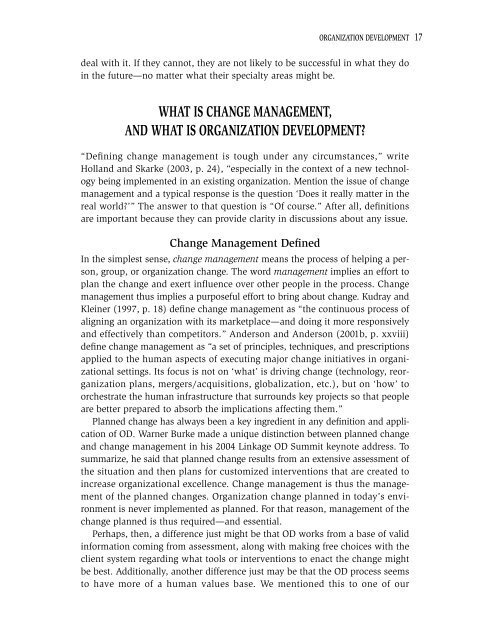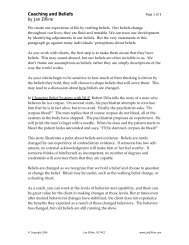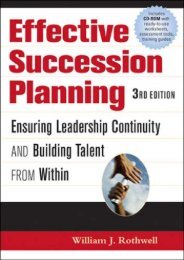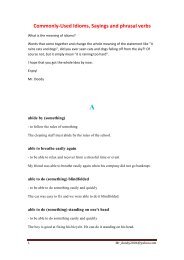- Page 3: About This Book Why is this topic i
- Page 6 and 7: Other Practicing Organization Devel
- Page 8 and 9: Copyright © 2005 by John Wiley & S
- Page 10 and 11: VIII CONTENTS 5. Competencies of OD
- Page 12 and 13: ∂ CONTENTS OF THE CD-ROM ∂ I. P
- Page 14 and 15: ∂ ∂ LIST OF EXHIBITS, FIGURES,
- Page 16 and 17: XIV LIST OF EXHIBITS, FIGURES, AND
- Page 19: ∂ ACKNOWLEGMENTS ∂ No book is t
- Page 22 and 23: XX BOARD STATEMENT one method of or
- Page 25 and 26: ∂ FOREWORD ∂ OD: A PROMISE YET
- Page 27 and 28: FOREWORD XXV have taken on the rhet
- Page 29: FOREWORD XXVII join them into an in
- Page 32 and 33: 2 PRACTICING ORGANIZATION DEVELOPME
- Page 34 and 35: 4 PRACTICING ORGANIZATION DEVELOPME
- Page 36 and 37: 6 PRACTICING ORGANIZATION DEVELOPME
- Page 39 and 40: ∂ CHAPTER ONE Organization Develo
- Page 41 and 42: ORGANIZATION DEVELOPMENT 11 Exhibit
- Page 43 and 44: ORGANIZATION DEVELOPMENT 13 change
- Page 45: ORGANIZATION DEVELOPMENT 15 is a re
- Page 49 and 50: ORGANIZATION DEVELOPMENT 19 • Org
- Page 51 and 52: ORGANIZATION DEVELOPMENT 21 OD is n
- Page 53 and 54: ORGANIZATION DEVELOPMENT 23 • Gam
- Page 55 and 56: ORGANIZATION DEVELOPMENT 25 Many pe
- Page 57 and 58: ORGANIZATION DEVELOPMENT 27 Systems
- Page 59 and 60: ORGANIZATION DEVELOPMENT 29 System
- Page 61 and 62: ORGANIZATION DEVELOPMENT 31 Exhibit
- Page 63 and 64: ORGANIZATION DEVELOPMENT 33 9. Ever
- Page 65 and 66: ORGANIZATION DEVELOPMENT 35 SUMMARY
- Page 67 and 68: ORGANIZATION DEVELOPMENT 37 Clardy,
- Page 69 and 70: ∂ CHAPTER TWO Models for Change W
- Page 71 and 72: MODELS FOR CHANGE 41 Exhibit 2.1. T
- Page 73 and 74: MODELS FOR CHANGE 43 As a process,
- Page 75 and 76: MODELS FOR CHANGE 45 the leader of
- Page 77 and 78: MODELS FOR CHANGE 47 process makes
- Page 79 and 80: MODELS FOR CHANGE 49 Interventions
- Page 81 and 82: MODELS FOR CHANGE 51 The consultant
- Page 83 and 84: MODELS FOR CHANGE 53 Applying AI th
- Page 85 and 86: MODELS FOR CHANGE 55 Anderson and A
- Page 87 and 88: MODELS FOR CHANGE 57 • Initial ac
- Page 89 and 90: MODELS FOR CHANGE 59 Marketing In o
- Page 91 and 92: MODELS FOR CHANGE 61 Transformative
- Page 93 and 94: MODELS FOR CHANGE 63 conversations
- Page 95 and 96: MODELS FOR CHANGE 65 use in breakou
- Page 97 and 98:
MODELS FOR CHANGE 67 • Together c
- Page 99 and 100:
MODELS FOR CHANGE 69 Peter Block (2
- Page 101 and 102:
MODELS FOR CHANGE 71 completed a br
- Page 103 and 104:
MODELS FOR CHANGE 73 • Ensuring t
- Page 105 and 106:
MODELS FOR CHANGE 75 Garvin (2000)
- Page 107 and 108:
MODELS FOR CHANGE 77 There is one v
- Page 109 and 110:
MODELS FOR CHANGE 79 Cooperrider, D
- Page 111 and 112:
∂ CHAPTER THREE On the Shoulders
- Page 113 and 114:
ON THE SHOULDERS OF GIANTS 83 • E
- Page 115 and 116:
ON THE SHOULDERS OF GIANTS 85 No on
- Page 117 and 118:
ON THE SHOULDERS OF GIANTS 87 The L
- Page 119 and 120:
ON THE SHOULDERS OF GIANTS 89 were
- Page 121 and 122:
ON THE SHOULDERS OF GIANTS 91 signi
- Page 123 and 124:
ON THE SHOULDERS OF GIANTS 93 able
- Page 125 and 126:
ON THE SHOULDERS OF GIANTS 95 • T
- Page 127 and 128:
Group Dynamics ON THE SHOULDERS OF
- Page 129 and 130:
ON THE SHOULDERS OF GIANTS 99 early
- Page 131 and 132:
ON THE SHOULDERS OF GIANTS 101 Open
- Page 133 and 134:
ON THE SHOULDERS OF GIANTS 103 thre
- Page 135 and 136:
ON THE SHOULDERS OF GIANTS 105 Refe
- Page 137 and 138:
USING THE HRD AUDIT TO BUILD CONVER
- Page 139 and 140:
USING THE HRD AUDIT TO BUILD CONVER
- Page 141 and 142:
USING THE HRD AUDIT TO BUILD CONVER
- Page 143 and 144:
USING THE HRD AUDIT TO BUILD CONVER
- Page 145 and 146:
USING THE HRD AUDIT TO BUILD CONVER
- Page 147 and 148:
USING THE HRD AUDIT TO BUILD CONVER
- Page 149 and 150:
Why an HRD Audit? To get the best f
- Page 151 and 152:
USING THE HRD AUDIT TO BUILD CONVER
- Page 153 and 154:
USING THE HRD AUDIT TO BUILD CONVER
- Page 155 and 156:
USING THE HRD AUDIT TO BUILD CONVER
- Page 157 and 158:
USING THE HRD AUDIT TO BUILD CONVER
- Page 159 and 160:
USING THE HRD AUDIT TO BUILD CONVER
- Page 161 and 162:
USING THE HRD AUDIT TO BUILD CONVER
- Page 163 and 164:
USING THE HRD AUDIT TO BUILD CONVER
- Page 165 and 166:
∂ CHAPTER FIVE Competencies of OD
- Page 167 and 168:
COMPETENCIES OF OD PRACTITIONERS 13
- Page 169 and 170:
COMPETENCIES OF OD PRACTITIONERS 13
- Page 171 and 172:
COMPETENCIES OF OD PRACTITIONERS 14
- Page 173 and 174:
COMPETENCIES OF OD PRACTITIONERS 14
- Page 175 and 176:
COMPETENCIES OF OD PRACTITIONERS 14
- Page 177 and 178:
Table 5.4. Comparison of Competency
- Page 179 and 180:
Sectional Analysis Pooled Items Ana
- Page 181 and 182:
Sectional Analysis Pooled Items Ana
- Page 183 and 184:
COMPETENCIES OF OD PRACTITIONERS 15
- Page 185 and 186:
Table 5.5. Comparison of Final Comp
- Page 187 and 188:
COMPETENCIES OF OD PRACTITIONERS 15
- Page 189 and 190:
COMPETENCIES OF OD PRACTITIONERS 15
- Page 191 and 192:
COMPETENCIES OF OD PRACTITIONERS 16
- Page 193 and 194:
COMPETENCIES OF OD PRACTITIONERS 16
- Page 195 and 196:
ORGANIZATION DEVELOPMENT FROM THE V
- Page 197 and 198:
ORGANIZATION DEVELOPMENT FROM THE V
- Page 199 and 200:
ORGANIZATION DEVELOPMENT FROM THE V
- Page 201 and 202:
ORGANIZATION DEVELOPMENT FROM THE V
- Page 203 and 204:
ORGANIZATION DEVELOPMENT FROM THE V
- Page 205 and 206:
ORGANIZATION DEVELOPMENT FROM THE V
- Page 207 and 208:
ORGANIZATION DEVELOPMENT FROM THE V
- Page 209 and 210:
ORGANIZATION DEVELOPMENT FROM THE V
- Page 211 and 212:
ORGANIZATION DEVELOPMENT FROM THE V
- Page 213 and 214:
ORGANIZATION DEVELOPMENT FROM THE V
- Page 215 and 216:
ORGANIZATION DEVELOPMENT FROM THE V
- Page 217 and 218:
ORGANIZATION DEVELOPMENT FROM THE V
- Page 219 and 220:
A FUTURE-RESPONSIVE PERSPECTIVE FOR
- Page 221 and 222:
A FUTURE-RESPONSIVE PERSPECTIVE FOR
- Page 223 and 224:
A FUTURE-RESPONSIVE PERSPECTIVE FOR
- Page 225 and 226:
A FUTURE-RESPONSIVE PERSPECTIVE FOR
- Page 227 and 228:
A FUTURE-RESPONSIVE PERSPECTIVE FOR
- Page 229 and 230:
A FUTURE-RESPONSIVE PERSPECTIVE FOR
- Page 231 and 232:
A FUTURE-RESPONSIVE PERSPECTIVE FOR
- Page 233 and 234:
A FUTURE-RESPONSIVE PERSPECTIVE FOR
- Page 235 and 236:
A FUTURE-RESPONSIVE PERSPECTIVE FOR
- Page 237 and 238:
A FUTURE-RESPONSIVE PERSPECTIVE FOR
- Page 239:
∂ PART TWO STEPS TO GUIDE PLANNED
- Page 242 and 243:
212 PRACTICING ORGANIZATION DEVELOP
- Page 244 and 245:
214 PRACTICING ORGANIZATION DEVELOP
- Page 246 and 247:
216 PRACTICING ORGANIZATION DEVELOP
- Page 248 and 249:
218 PRACTICING ORGANIZATION DEVELOP
- Page 250 and 251:
220 PRACTICING ORGANIZATION DEVELOP
- Page 252 and 253:
222 PRACTICING ORGANIZATION DEVELOP
- Page 254 and 255:
224 PRACTICING ORGANIZATION DEVELOP
- Page 256 and 257:
226 PRACTICING ORGANIZATION DEVELOP
- Page 258 and 259:
228 PRACTICING ORGANIZATION DEVELOP
- Page 260 and 261:
230 PRACTICING ORGANIZATION DEVELOP
- Page 262 and 263:
232 PRACTICING ORGANIZATION DEVELOP
- Page 264 and 265:
234 PRACTICING ORGANIZATION DEVELOP
- Page 266 and 267:
236 PRACTICING ORGANIZATION DEVELOP
- Page 268 and 269:
∂ CHAPTER NINE Pre-Launch David W
- Page 270 and 271:
240 PRACTICING ORGANIZATION DEVELOP
- Page 272 and 273:
242 PRACTICING ORGANIZATION DEVELOP
- Page 274 and 275:
244 PRACTICING ORGANIZATION DEVELOP
- Page 276 and 277:
246 PRACTICING ORGANIZATION DEVELOP
- Page 278 and 279:
248 PRACTICING ORGANIZATION DEVELOP
- Page 280 and 281:
250 PRACTICING ORGANIZATION DEVELOP
- Page 282 and 283:
252 PRACTICING ORGANIZATION DEVELOP
- Page 284 and 285:
254 PRACTICING ORGANIZATION DEVELOP
- Page 286 and 287:
256 PRACTICING ORGANIZATION DEVELOP
- Page 288 and 289:
258 PRACTICING ORGANIZATION DEVELOP
- Page 290 and 291:
260 PRACTICING ORGANIZATION DEVELOP
- Page 292 and 293:
262 PRACTICING ORGANIZATION DEVELOP
- Page 294 and 295:
264 PRACTICING ORGANIZATION DEVELOP
- Page 296 and 297:
266 PRACTICING ORGANIZATION DEVELOP
- Page 298 and 299:
268 PRACTICING ORGANIZATION DEVELOP
- Page 300 and 301:
270 PRACTICING ORGANIZATION DEVELOP
- Page 302 and 303:
272 PRACTICING ORGANIZATION DEVELOP
- Page 304 and 305:
274 PRACTICING ORGANIZATION DEVELOP
- Page 306 and 307:
276 PRACTICING ORGANIZATION DEVELOP
- Page 308 and 309:
278 PRACTICING ORGANIZATION DEVELOP
- Page 310 and 311:
280 PRACTICING ORGANIZATION DEVELOP
- Page 312 and 313:
282 PRACTICING ORGANIZATION DEVELOP
- Page 314 and 315:
284 PRACTICING ORGANIZATION DEVELOP
- Page 316 and 317:
286 PRACTICING ORGANIZATION DEVELOP
- Page 318 and 319:
288 PRACTICING ORGANIZATION DEVELOP
- Page 320 and 321:
290 PRACTICING ORGANIZATION DEVELOP
- Page 322 and 323:
292 PRACTICING ORGANIZATION DEVELOP
- Page 324 and 325:
294 PRACTICING ORGANIZATION DEVELOP
- Page 326 and 327:
296 PRACTICING ORGANIZATION DEVELOP
- Page 328 and 329:
298 PRACTICING ORGANIZATION DEVELOP
- Page 330 and 331:
300 PRACTICING ORGANIZATION DEVELOP
- Page 332 and 333:
302 PRACTICING ORGANIZATION DEVELOP
- Page 334 and 335:
304 PRACTICING ORGANIZATION DEVELOP
- Page 336 and 337:
306 PRACTICING ORGANIZATION DEVELOP
- Page 338 and 339:
308 PRACTICING ORGANIZATION DEVELOP
- Page 340 and 341:
310 PRACTICING ORGANIZATION DEVELOP
- Page 342 and 343:
312 PRACTICING ORGANIZATION DEVELOP
- Page 344 and 345:
314 PRACTICING ORGANIZATION DEVELOP
- Page 346 and 347:
316 PRACTICING ORGANIZATION DEVELOP
- Page 348 and 349:
318 PRACTICING ORGANIZATION DEVELOP
- Page 350 and 351:
320 PRACTICING ORGANIZATION DEVELOP
- Page 352 and 353:
322 PRACTICING ORGANIZATION DEVELOP
- Page 354 and 355:
324 PRACTICING ORGANIZATION DEVELOP
- Page 356 and 357:
326 PRACTICING ORGANIZATION DEVELOP
- Page 358 and 359:
328 PRACTICING ORGANIZATION DEVELOP
- Page 360 and 361:
330 PRACTICING ORGANIZATION DEVELOP
- Page 362 and 363:
332 PRACTICING ORGANIZATION DEVELOP
- Page 364 and 365:
334 PRACTICING ORGANIZATION DEVELOP
- Page 366 and 367:
336 PRACTICING ORGANIZATION DEVELOP
- Page 368 and 369:
338 PRACTICING ORGANIZATION DEVELOP
- Page 370 and 371:
340 PRACTICING ORGANIZATION DEVELOP
- Page 372 and 373:
342 PRACTICING ORGANIZATION DEVELOP
- Page 374 and 375:
344 PRACTICING ORGANIZATION DEVELOP
- Page 376 and 377:
346 PRACTICING ORGANIZATION DEVELOP
- Page 378 and 379:
348 PRACTICING ORGANIZATION DEVELOP
- Page 380 and 381:
350 PRACTICING ORGANIZATION DEVELOP
- Page 382 and 383:
352 PRACTICING ORGANIZATION DEVELOP
- Page 384 and 385:
∂ CHAPTER THIRTEEN Separation W.
- Page 386 and 387:
356 PRACTICING ORGANIZATION DEVELOP
- Page 388 and 389:
358 PRACTICING ORGANIZATION DEVELOP
- Page 390 and 391:
360 PRACTICING ORGANIZATION DEVELOP
- Page 393:
∂ PART THREE ∂ LEVELS OF ORGANI
- Page 396 and 397:
366 PRACTICING ORGANIZATION DEVELOP
- Page 398 and 399:
368 PRACTICING ORGANIZATION DEVELOP
- Page 400 and 401:
370 PRACTICING ORGANIZATION DEVELOP
- Page 402 and 403:
372 PRACTICING ORGANIZATION DEVELOP
- Page 404 and 405:
374 PRACTICING ORGANIZATION DEVELOP
- Page 406 and 407:
∂ CHAPTER FIFTEEN Person-Centered
- Page 408 and 409:
378 PRACTICING ORGANIZATION DEVELOP
- Page 410 and 411:
380 PRACTICING ORGANIZATION DEVELOP
- Page 412 and 413:
382 PRACTICING ORGANIZATION DEVELOP
- Page 414 and 415:
384 PRACTICING ORGANIZATION DEVELOP
- Page 416 and 417:
386 PRACTICING ORGANIZATION DEVELOP
- Page 418 and 419:
388 PRACTICING ORGANIZATION DEVELOP
- Page 420 and 421:
390 PRACTICING ORGANIZATION DEVELOP
- Page 422 and 423:
392 PRACTICING ORGANIZATION DEVELOP
- Page 424 and 425:
394 PRACTICING ORGANIZATION DEVELOP
- Page 426 and 427:
396 PRACTICING ORGANIZATION DEVELOP
- Page 428 and 429:
398 PRACTICING ORGANIZATION DEVELOP
- Page 430 and 431:
400 PRACTICING ORGANIZATION DEVELOP
- Page 432 and 433:
402 PRACTICING ORGANIZATION DEVELOP
- Page 434 and 435:
404 PRACTICING ORGANIZATION DEVELOP
- Page 436 and 437:
406 PRACTICING ORGANIZATION DEVELOP
- Page 438 and 439:
408 PRACTICING ORGANIZATION DEVELOP
- Page 440 and 441:
410 PRACTICING ORGANIZATION DEVELOP
- Page 442 and 443:
412 PRACTICING ORGANIZATION DEVELOP
- Page 444 and 445:
414 PRACTICING ORGANIZATION DEVELOP
- Page 446 and 447:
416 PRACTICING ORGANIZATION DEVELOP
- Page 448 and 449:
418 PRACTICING ORGANIZATION DEVELOP
- Page 450 and 451:
∂ CHAPTER SEVENTEEN Interventions
- Page 452 and 453:
422 PRACTICING ORGANIZATION DEVELOP
- Page 454 and 455:
424 PRACTICING ORGANIZATION DEVELOP
- Page 456 and 457:
426 PRACTICING ORGANIZATION DEVELOP
- Page 458 and 459:
428 PRACTICING ORGANIZATION DEVELOP
- Page 460 and 461:
430 PRACTICING ORGANIZATION DEVELOP
- Page 462 and 463:
432 PRACTICING ORGANIZATION DEVELOP
- Page 464 and 465:
434 PRACTICING ORGANIZATION DEVELOP
- Page 466 and 467:
436 PRACTICING ORGANIZATION DEVELOP
- Page 468 and 469:
438 PRACTICING ORGANIZATION DEVELOP
- Page 470 and 471:
∂ CHAPTER EIGHTEEN Whole System T
- Page 472 and 473:
442 PRACTICING ORGANIZATION DEVELOP
- Page 474 and 475:
444 PRACTICING ORGANIZATION DEVELOP
- Page 476 and 477:
446 PRACTICING ORGANIZATION DEVELOP
- Page 478 and 479:
448 PRACTICING ORGANIZATION DEVELOP
- Page 480 and 481:
450 PRACTICING ORGANIZATION DEVELOP
- Page 482 and 483:
452 PRACTICING ORGANIZATION DEVELOP
- Page 484 and 485:
454 PRACTICING ORGANIZATION DEVELOP
- Page 486 and 487:
∂ CHAPTER NINETEEN OD Through Int
- Page 488 and 489:
458 PRACTICING ORGANIZATION DEVELOP
- Page 490 and 491:
460 PRACTICING ORGANIZATION DEVELOP
- Page 492 and 493:
462 PRACTICING ORGANIZATION DEVELOP
- Page 495 and 496:
∂ PART FOUR SPECIAL ISSUES IN OD
- Page 497 and 498:
∂ CHAPTER TWENTY Global Organizat
- Page 499 and 500:
GLOBAL ORGANIZATION DEVELOPMENT 469
- Page 501 and 502:
GLOBAL ORGANIZATION DEVELOPMENT 471
- Page 503 and 504:
GLOBAL ORGANIZATION DEVELOPMENT 473
- Page 505 and 506:
GLOBAL ORGANIZATION DEVELOPMENT 475
- Page 507 and 508:
GLOBAL ORGANIZATION DEVELOPMENT 477
- Page 509 and 510:
GLOBAL ORGANIZATION DEVELOPMENT 479
- Page 511 and 512:
GLOBAL ORGANIZATION DEVELOPMENT 481
- Page 513 and 514:
GLOBAL ORGANIZATION DEVELOPMENT 483
- Page 515 and 516:
GLOBAL ORGANIZATION DEVELOPMENT 485
- Page 517 and 518:
GLOBAL ORGANIZATION DEVELOPMENT 487
- Page 519 and 520:
GLOBAL ORGANIZATION DEVELOPMENT 489
- Page 521 and 522:
GLOBAL ORGANIZATION DEVELOPMENT 491
- Page 523 and 524:
∂ CHAPTER TWENTY-ONE ∂ Values,
- Page 525 and 526:
VALUES, ETHICS, AND PRACTICE IN THE
- Page 527 and 528:
VALUES, ETHICS, AND PRACTICE IN THE
- Page 529 and 530:
VALUES, ETHICS, AND PRACTICE IN THE
- Page 531 and 532:
VALUES, ETHICS, AND PRACTICE IN THE
- Page 533 and 534:
VALUES, ETHICS, AND PRACTICE IN THE
- Page 535 and 536:
VALUES, ETHICS, AND PRACTICE IN THE
- Page 537 and 538:
VALUES, ETHICS, AND PRACTICE IN THE
- Page 539 and 540:
VALUES, ETHICS, AND PRACTICE IN THE
- Page 541 and 542:
BRINGING EVERY MIND INTO THE GAME T
- Page 543 and 544:
BRINGING EVERY MIND INTO THE GAME T
- Page 545 and 546:
BRINGING EVERY MIND INTO THE GAME T
- Page 547 and 548:
BRINGING EVERY MIND INTO THE GAME T
- Page 549 and 550:
BRINGING EVERY MIND INTO THE GAME T
- Page 551 and 552:
BRINGING EVERY MIND INTO THE GAME T
- Page 553 and 554:
BRINGING EVERY MIND INTO THE GAME T
- Page 555 and 556:
BRINGING EVERY MIND INTO THE GAME T
- Page 557 and 558:
BRINGING EVERY MIND INTO THE GAME T
- Page 559 and 560:
BRINGING EVERY MIND INTO THE GAME T
- Page 561 and 562:
BRINGING EVERY MIND INTO THE GAME T
- Page 563 and 564:
BRINGING EVERY MIND INTO THE GAME T
- Page 565 and 566:
BRINGING EVERY MIND INTO THE GAME T
- Page 567 and 568:
BRINGING EVERY MIND INTO THE GAME T
- Page 569 and 570:
∂ CHAPTER TWENTY-THREE Human Syst
- Page 571 and 572:
HUMAN SYSTEMS DYNAMICS 541 communit
- Page 573 and 574:
HUMAN SYSTEMS DYNAMICS 543 These ch
- Page 575 and 576:
HUMAN SYSTEMS DYNAMICS 545 that app
- Page 577 and 578:
HUMAN SYSTEMS DYNAMICS 547 The abil
- Page 579 and 580:
HUMAN SYSTEMS DYNAMICS 549 Referenc
- Page 581 and 582:
TECHNOLOGY AND ORGANIZATION DEVELOP
- Page 583 and 584:
TECHNOLOGY AND ORGANIZATION DEVELOP
- Page 585 and 586:
TECHNOLOGY AND ORGANIZATION DEVELOP
- Page 587 and 588:
TECHNOLOGY AND ORGANIZATION DEVELOP
- Page 589 and 590:
TECHNOLOGY AND ORGANIZATION DEVELOP
- Page 591 and 592:
TECHNOLOGY AND ORGANIZATION DEVELOP
- Page 593 and 594:
TECHNOLOGY AND ORGANIZATION DEVELOP
- Page 595 and 596:
TECHNOLOGY AND ORGANIZATION DEVELOP
- Page 597 and 598:
Table 24.1. Collaborative Groups Af
- Page 599 and 600:
Affinity Networks Learning Communit
- Page 601 and 602:
Technical Architecture TECHNOLOGY A
- Page 603 and 604:
TECHNOLOGY AND ORGANIZATION DEVELOP
- Page 605 and 606:
TECHNOLOGY AND ORGANIZATION DEVELOP
- Page 607 and 608:
TECHNOLOGY AND ORGANIZATION DEVELOP
- Page 609 and 610:
TECHNOLOGY AND ORGANIZATION DEVELOP
- Page 611 and 612:
TECHNOLOGY AND ORGANIZATION DEVELOP
- Page 613 and 614:
∂ CHAPTER TWENTY-FIVE The Personh
- Page 615 and 616:
THE PERSONHOOD OF THE CONSULTANT 58
- Page 617 and 618:
HOW PRACTITIONERS CAN GET IN THEIR
- Page 619 and 620:
THE PERSONHOOD OF THE CONSULTANT 58
- Page 621 and 622:
THE PERSONHOOD OF THE CONSULTANT 59
- Page 623 and 624:
THE PERSONHOOD OF THE CONSULTANT 59
- Page 625 and 626:
THE PERSONHOOD OF THE CONSULTANT 59
- Page 627 and 628:
THE PERSONHOOD OF THE CONSULTANT 59
- Page 629 and 630:
THE PERSONHOOD OF THE CONSULTANT 59
- Page 631 and 632:
THE PERSONHOOD OF THE CONSULTANT 60
- Page 633 and 634:
THE PERSONHOOD OF THE CONSULTANT 60
- Page 635 and 636:
THE PERSONHOOD OF THE CONSULTANT 60
- Page 637 and 638:
∂ CHAPTER TWENTY-SIX Adding to th
- Page 639 and 640:
PERCEIVE The first step in slowing
- Page 641 and 642:
ADDING TO THE COMPLEXITY OF PERSONA
- Page 643 and 644:
ADDING TO THE COMPLEXITY OF PERSONA
- Page 645 and 646:
ADDING TO THE COMPLEXITY OF PERSONA
- Page 647 and 648:
ADDING TO THE COMPLEXITY OF PERSONA
- Page 649 and 650:
ADDING TO THE COMPLEXITY OF PERSONA
- Page 651 and 652:
PRACTICING INTERNAL OD 621 Traditio
- Page 653 and 654:
PRACTICING INTERNAL OD 623 15. With
- Page 655 and 656:
PRACTICING INTERNAL OD 625 OD pract
- Page 657 and 658:
PRACTICING INTERNAL OD 627 provide
- Page 659 and 660:
PRACTICING INTERNAL OD 629 • An e
- Page 661 and 662:
PRACTICING INTERNAL OD 631 the OD r
- Page 663 and 664:
PRACTICING INTERNAL OD 633 those re
- Page 665 and 666:
PRACTICING INTERNAL OD 635 Competen
- Page 667 and 668:
PRACTICING INTERNAL OD 637 These fi
- Page 669 and 670:
PRACTICING INTERNAL OD 639 the exch
- Page 671 and 672:
PRACTICING INTERNAL OD 641 Last, it
- Page 673 and 674:
PRACTICING INTERNAL OD 643 SIMILARI
- Page 675 and 676:
PRACTICING INTERNAL OD 645 Henning,
- Page 677 and 678:
OUR WORK FOR THE TIMES IN WHICH WE
- Page 679 and 680:
OUR WORK FOR THE TIMES IN WHICH WE
- Page 681 and 682:
OUR WORK FOR THE TIMES IN WHICH WE
- Page 683 and 684:
OUR WORK FOR THE TIMES IN WHICH WE
- Page 685 and 686:
Creativity OUR WORK FOR THE TIMES I
- Page 687 and 688:
APPENDIX I: A SELF-ASSESSMENT TOOL
- Page 689 and 690:
APPENDIX I: A SELF-ASSESSMENT TOOL
- Page 691 and 692:
APPENDIX I: A SELF-ASSESSMENT TOOL
- Page 693 and 694:
APPENDIX I: A SELF-ASSESSMENT TOOL
- Page 695 and 696:
APPENDIX II: FUTURE OD PRACTICE AND
- Page 697 and 698:
APPENDIX II: FUTURE OD PRACTICE AND
- Page 699 and 700:
APPENDIX II: FUTURE OD PRACTICE AND
- Page 701 and 702:
APPENDIX II: FUTURE OD PRACTICE AND
- Page 703 and 704:
∂ ABOUT THE EDITORS ∂ William J
- Page 705 and 706:
∂ ∂ ABOUT THE CONTRIBUTING AUTH
- Page 707 and 708:
ABOUT THE CONTRIBUTING AUTHORS 677
- Page 709 and 710:
ABOUT THE CONTRIBUTING AUTHORS 679
- Page 711 and 712:
ABOUT THE CONTRIBUTING AUTHORS 681
- Page 713 and 714:
ABOUT THE CONTRIBUTING AUTHORS 683
- Page 715 and 716:
ABOUT THE CONTRIBUTING AUTHORS 685
- Page 717 and 718:
ABOUT THE CONTRIBUTING AUTHORS 687
- Page 719 and 720:
ABOUT THE CONTRIBUTING AUTHORS 689
- Page 721 and 722:
ABOUT THE CONTRIBUTING AUTHORS 691
- Page 723 and 724:
∂ ABOUT THE SERIES EDITORS ∂ Wi
- Page 725 and 726:
∂ ABOUT THE BOARD MEMBERS ∂ Dav
- Page 727 and 728:
S SUBJECT INDEX S A Abilene Paradox
- Page 729 and 730:
SUBJECT INDEX 699 The Change Leader
- Page 731 and 732:
SUBJECT INDEX 701 behaviors, 335-33
- Page 733 and 734:
SUBJECT INDEX 703 external and, 642
- Page 735 and 736:
SUBJECT INDEX 705 newer contributio
- Page 737 and 738:
SUBJECT INDEX 707 Psychological rea
- Page 739 and 740:
SUBJECT INDEX 709 and creativity),
- Page 741 and 742:
NAME INDEX 711 Bickman, L., 346 Bie
- Page 743 and 744:
NAME INDEX 713 Halal, W., 428 Hall,
- Page 745 and 746:
NAME INDEX 715 Nakajima, A., 102 Ne
- Page 747 and 748:
NAME INDEX 717 Wilson, L., 506 Wils
- Page 749 and 750:
Pfeiffer Publications Guide This gu
- Page 751 and 752:
GAME A group activity that has the
- Page 753:
What will you find on pfeiffer.com?
















